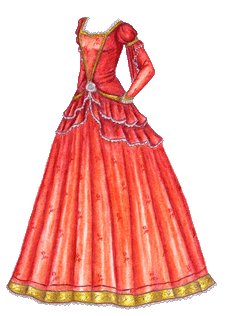 Click for larger version; click for the list of dolls.
Click for larger version; click for the list of dolls.
Once upon a time, a king and twelve princesses lived in a distant land far in the north. Some of the princesses were his own daughters, some were adopted, some were cousins of varying distances, but they were all kind, merry and if not all wise, at least exceedingly smart. The king, whatever his other faults, loved them all dearly and considered all of them his own, but this affection, no longer tempered by the wisdom of the queen who had passed on in their childhood, led to over-protecting his precious girls. For he had read the story of the man who became Buddha, but managed to glean the wrong lesson entirely from it. “Such a wise man the Buddha’s father was, such sound ideas of child-rearing,” he thought, and therefore the princesses were brought up with the utmost care. They never knew even a mild cold, much less contact with bitter poverty or death; even balls were forbidden. “You would get chilled to the bone just leaving the castle,” insisted the King, “you would have to travel for hours, and goodness knows what kinds of people you might meet at one of those sordid affairs.” Instead, when a suitor came to call, he would be forced into a game of chess with the desired princess, the King standing behind her, smiling gleefully as his daughter beat the stuffing out of the flabbergasted suitor.
For the princesses were all very good at chess, having played each other for hours on end. As a matter of fact, they were accomplished at all one might learn or do without leaving the castle, for they were smart women and hated being bored. Perdita, the eldest, was the cleverest and the best at chess, but they all had their specialties. For example, Camellia was the wisest, with the personality of a judge and a few books about the laws of her country and child rearing under her belt, while Juliette had perfect pitch and a knack for playing about any instrument she touched.
Winter in this kingdom was much like any other season there, but the princesses felt even more restless than usual around this time of year. They had no Christmas parties to look forwards to, no way to help the less fortunate, no one to carol to except the castle residents who had heard all their songs before. They would do things like read Christmas stories to each other and decorate the castle to within an inch of its life, of course, but it wasn’t really what they hoped for. They pleaded for a change of some sort, as they had every year, and their father was getting quite tired of all their petitions and complaints. Then, one day near the beginning of December, the petitions suddenly stopped. The King — not, frankly, a very introspective man — thought they had finally learned that whining got them nowhere.
He was very angry, then, to learn that the silence didn’t stem from obedience, but from subterfuge. For after luxuriating in the silence for a week, he learned from the royal cobbler one morning that the princesses had all requested new slippers recently. This seemed a trivial fact to him, and he was prepared to scold the cobbler for bothering him with nonsense, until the cobbler patiently spelled it out for him.
“Your Majesty, it seemed strange to me merely because the slippers are so new, I made them just two months ago, but now they return to me so very worn. Usually the princesses’ slippers last for a good deal of time — well, except for the twins’ shoes.” The king frowned, obviously preparing to scold, and the cobbler went on quickly. “So you see, these shoes have seen a great deal of use as of late…”
“Use? What do you mean?”
“I mean,” stammered the cobbler, who was a wise old man who was a little embarrassed about having to explain something so obvious, “that they are walking more, perhaps, or dancing, or leaving the castle. Nothing else can account for how worn the slippers look in such a short time.”
“What?!” roared the king, jumping up from his throne. “Dancing? Leaving the castle? I knew it! I knew they were being too quiet,” he said triumphantly, although he had known nothing of the kind. He snatched the worn pair of shoes from the cobbler and stormed down the hallway to the princesses’ chambers. Throwing open the door, he boomed, “Whose shoes are these?”
(To be continued…)
This dress belongs to Perdita, the oldest at twenty-five. She’s the cleverest of all the princesses and the best at chess. She’s very close to Camellia, the next eldest of the princesses, but all of the girls look up to her and respect her. A placid woman, she usually accepts her father’s ideas and orders, and enjoys her life in the castle, where she can practice chess and write stories (in secret) to her heart’s content. But she’s only placid as long as she’s content, and if she feels put-upon and frustrated she can be hard to deal with. She loves the color red and roses of every color.
 Share
Share